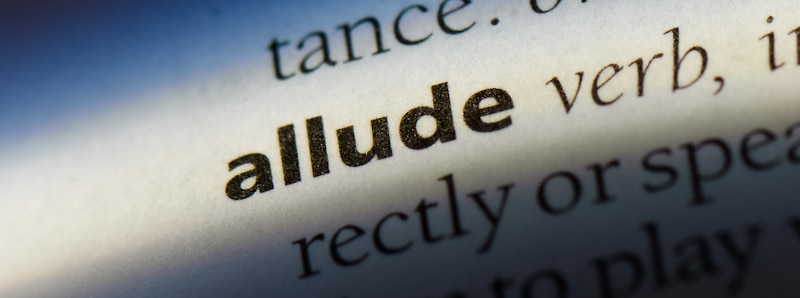We sometimes find the use of two words confusing thanks to the similarities in their pronunciation or spelling. In this case, understanding the distinct nature of both words and when to use them becomes important. One of such words is “allude” and “elude.” So, are “allude” and “elude” the same? Which one should we use?
“Allude” is a verb that indirectly refers to or calls attention to another thing. In turn, it gets mostly used with the preposition to. “Elude” is another verb that indicates escaping, avoiding, or evading something or someone through speed, trickery, and cleverness. It can also have figurative meaning.
Still, there is so much that distinguishes these two words. How do you further distinguish both words? In this article, we further address all that. This way, you can easily navigate through the usage of both words.

When to and How to Properly Use “Allude”
The term “allude” represents a verb that functions to refer to something either indirectly or casually. In this case, this word alludes to an event, place, or someone. Note that one thing common to this word is its constant usage with the preposition “to.”
This word first emerged between 1525 to 1535 and can be traced to the Latin term “alludere.” In turn, this Latin term meant “make a playful allusion to, to play beside.”
As such, you should use the word “allude” in cases where you intend to refer to an idea or event, or concept. And you do not want to be straightforward with the reference. Examples of its usages include:
- My father regularly alludes to my bad grades in every conversation, and I am convinced he takes joy in it.
(The father does not actually mention the bad grades. Instead, he indirectly makes reference to it in a manner that the affected party can deduce.)
- The recent movie spent a large part of its screen time focusing on the antagonist just to allude to the hero’s doomed fate.
(The movie merely indicates the hero’s doomed fate. It fails to state it directly.)
- In fact, my novel alludes to the existence of various versions of the myth, “sleeping beauty” – would that be fatal?
(The novel does not state that there are, in fact, various versions of the sleeping beauty myth. It merely hints at its existence, leaving the reader to conclude.)
So, keep in mind that the word “allude” comes in when you try to refer to someone or something indirectly. It is also applicable where you refer to a thing in passing without discussing it at length. For instance, if you were to allude to the main points rather than going deep into the topic.
However, keep in mind that you should limit the use of the word to indirect reference. It would be best if you did not confuse it with the word refer or quote. The word “allude” allows you to avoid stating something plainly. That is, give a mention to someone or something without actually naming it.
On the other hand, if you intend to name it outrightly, the word refer becomes appropriate. So, remember that the word “refers” or “quote” remains best suited for direct mentions or quotation. On the other hand, the word “allude” is for indirect mention.
Further, you can also use the word “allude” to recall a prior work of art by drawing a relationship with new artwork. For instance, where you claim a specific art refers to another old art. Examples of its usage include:
- There is no way you can deny that the paintings allude to the Italian Renaissance painting.
(The new painting shows the features of the older Italian renaissance painting.)
- The design alludes to the legendary entry design by Channel at the turn of the decade.
(The new design has some relationship or shares some features with a previous design by Channel)
When to and How to Properly Use “Elude”
The word “elude” on its part is a verb that sounds just like the word “allude,” as you can tell. However, both words refer to distinct things or scenarios. In the case of the word “elude,” it concerns avoiding or escaping someone or something through acts of cleverness or trickery. In most cases, this word gets used with objects.
This word first emerged between 1530 and 1540, one like that of the word “allude.” Like most English terms, this word also has its origin traceable to the Latin term, “eludere.” This term meant “to evade, to deceive.”

As such, you should use the word “elude” in cases where you are trying to establish that something or someone continues to evade something or someone else. As we earlier stated, the word’s function is to establish cases where there is an escape or where someone avoids the other.
Examples of its usage include:
- The rabbit does not fail to elude our traps regardless of how well-thought-out we believe our traps are; the rabbit must be spying on us.
(The rabbit consistently escaped regardless of the various traps that the house owners set for it.)
- I cannot seem to elude that athlete in every competition I go for. I would have won at least a few if he had not shown up.
(The speaker cannot seem to escape another athlete who performs better than the speaker at every competition, making it impossible for the speaker to win.)
- There is no way to elude the top companies if they actually want you for a position; they go all the way out.
(You cannot escape top companies the moment they want you for a post.)
Beyond this, the word also reflects some figurative meaning. This instance reflects something beyond the perception, appreciation of, or understating of another. In this instance, the core idea remains the same. However, what is evaded is an abstract concept or, better off, an idea.
Examples of its usage include:
- The inspiration I badly need to complete my term paper continues to elude me regardless of my many efforts.
(While the speaker needs some inspiration to complete the term paper, that inspiration continues to be beyond the speaker’s reach.)
- The whole concept of the Tamagotchi Fad no doubt surprises me. However, it continues to elude the family.
(The Tamagotchi fad has evaded all members of the family.)
- To be quite honest, my research established that cheap and good healthcare continues to elude less developed countries.
(There are adequate reports that show that good health care remains beyond the reach of people in less developed countries.)
So, have it in mind that the word “elude” comes in when you talk about avoiding or escaping or that you are being avoided or something evades you. Note that what you avoid or what avoids you is not just limited to a person or thing. Instead, it extends to ideas that you cannot exactly seem to understand. In such cases, the usage becomes figurative.
“Allude” and “Elude:” Other Things to Keep in Mind
The next aspect that deserves our attention is the pronunciation of both words. Precisely, these words are not only similar in spellings; they also have similar pronunciations. This is thanks to the second syllable accent that they both have.
Regardless, you can also distinguish them in their pronunciation. We bet you are wondering how to achieve this. Do not worry; we have got you covered. Here is how to approach distinguishing the pronunciation of both words.
When it comes to the word allude, it comes with a flat sound when pronouncing the A that begins the word. The sound comes off as “ah.” As such, the pronunciation goes as “Ahllude.” Cool, right?
All you need to do is add an “H” after the first letter of the word “allude,” and you should be good to go.
On the other hand, when it comes to the word “elude,” it comes with a hard “E” sound when pronouncing the “E” that begins the word. The sound comes off as “ee.” As such, the pronunciation goes as “Eelude.”

Final Thoughts
While there have been various instances where both words get confused, that should not be the case with you anymore. You can now tell the difference in their meaning and function, and of course, pronunciation. Still, here is our last charge to help you remember the differences.
When it comes to the word “elude,” it begins with an “E.” This is the case with the word escape and evade. So, the word “elude” means to evade or escape. When it comes to “allude,” it begins with an “A,” just like the word absence. So, the word “allude” means to make indirect references in the absence of a direct reference.
So, when thinking to avoid, we will use “elude” and when thinking of the figurative presence of something or someone we will use “allude.”
Cool right? We bet it is. So, go out there and get it right!
Shawn Manaher is the founder and CEO of The Content Authority. He’s one part content manager, one part writing ninja organizer, and two parts leader of top content creators. You don’t even want to know what he calls pancakes.

